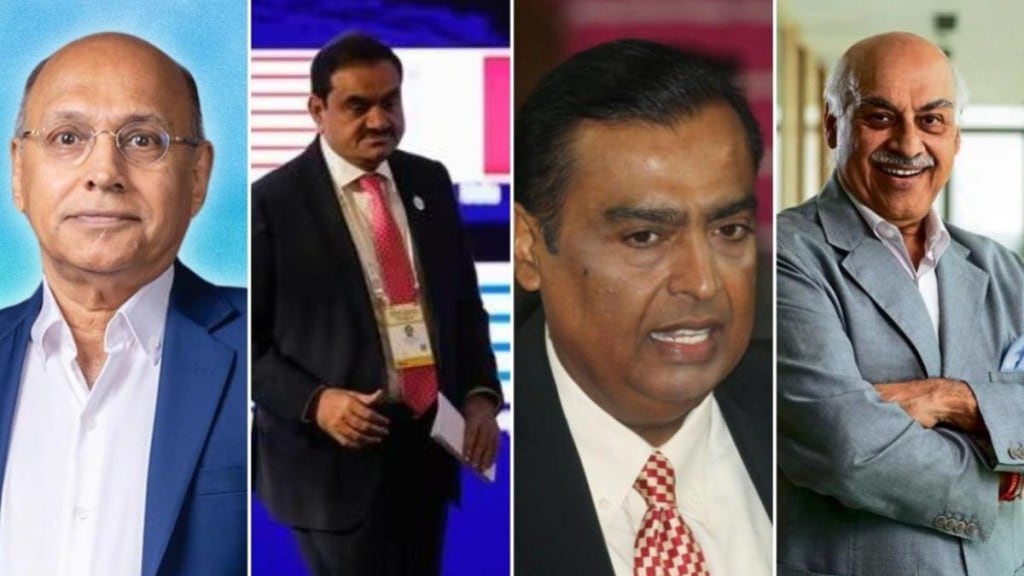India’s billionaires find themselves in the crosshairs of the United States after the Donald Trump-led government imposed an additional punitive tariff of 50%. Washington has justified the move by claiming that India’s oil trade with Russia is “financing the war in Ukraine”.
The move sent shockwaves through the country as the US is India’s largest export destination. In terms of monetary value, the United States imported $87.3 billion worth of Indian goods last year alone i.e. 18% of its total exports. The new duties on India have hit sectors like textiles, gems and jewellery, shrimp, among others.
The decision comes at a time when Indian business families have been enjoying an unusual global advantage. Amid the geopolitical changes across the world, Western markets sought alternatives and several India’s corporate titans like Reliance, Adani Group, found themselves attracting global capital and diversifying into new markets. The punitive tariffs imposed on India have now put these corporations in the crosshairs of Washington.
Punitive tariffs hit Indian businesses
Speaking to Bloomberg, Deepak Padaki of Catamaran Ventures, the family office of Infosys billionaire Narayana Murthy, said, “We’re in the midst of a hornet’s nest right now with the tariffs.” US Treasury Secretary Scott Bessent had earlier said, without naming names, that some of India’s richest families had profited from the purchase of Russian crude. According to Bloomberg, Reliance Industries is the largest buyer of Russian oil. Others, from textile exporters to infrastructure giants, now find themselves caught in the crossfire.
Here’s a list of Indian billionaires whose businesses might feel the hit from 50% tariffs
Reliance Industries, Mukesh Ambani
Mukesh Ambani’s empire spans petrochemicals, consumer goods, retail and digital services. According to Bloomberg, its oil-to-chemicals division reported $71.1 billion in revenue last year, with exports making up 45%. Reliance’s US energy operations also expose it to policy swings. While not directly targeted, its Russian crude sourcing has become a lightning rod in Washington.
Adani Group, Gautam Adani
Gautam Adani’s infrastructure giant operates India’s largest network of ports and terminals. With a 27% market share, any slowdown in exports due to tariffs could dent cargo volumes. His fast-growing solar cell exports — much of which go to US buyers — face immediate cost pressures. Already under scrutiny from US regulators over unrelated probes, the tariffs add another challenge.
Eicher Motors, Vikram Lal
Known for Royal Enfield bikes, Eicher entered the US in 2018 and now commands an 8% share of the mid-size motorcycle market. The company pre-shipped nearly 9,000 bikes before the tariffs took effect but will now face higher duties that could dampen demand and push costs onto US buyers.
Polycab India, Inder Jaisinghani
Polycab, India’s leading household electronics brand, counts the US as its largest overseas market. Exports form just 6% of revenue but the disproportionate role of the US makes tariffs disruptive. Growth ambitions in North America may now slow.
Motherson Group, Vivek Chaand Sehgal
The automotive parts supplier derives 19% of its revenue from the US. However, much of its output is manufactured locally, offering some insulation. Still, slower auto demand due to higher vehicle prices could ripple through its customer base.
Bharat Forge, Baba Kalyani
A leader in forged components and defense engineering, Bharat Forge exported $200M worth of products to the US in 2024-25, about 10% of revenue. The tariffs risk squeezing margins, particularly in automotive components.
Welspun World, Balkrishan Goenka
One of the largest home textile exporters to US retail giants like Walmart and Costco, Welspun earned 61% of its revenues from the American market last year. The tariffs directly threaten sales volumes and could raise costs at its US manufacturing units.

